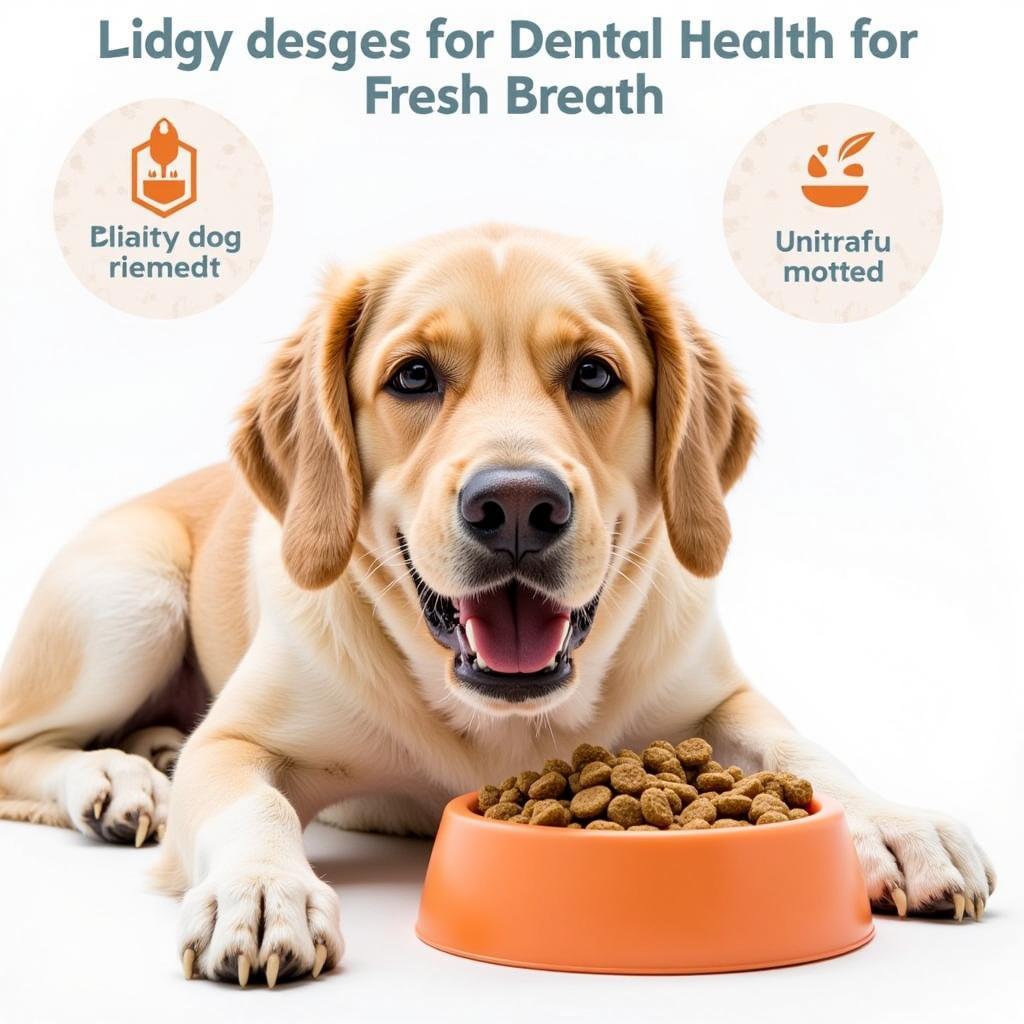Dealing with your furry friend’s less-than-fresh breath? Finding the Best Dog Food To Eliminate Bad Breath can make a world of difference. We’ll explore the causes of canine halitosis and dive into the top food choices to help your pup achieve a healthier, sweeter-smelling smile.
Understanding the Causes of Bad Breath in Dogs
Bad breath, also known as halitosis, isn’t just an unpleasant inconvenience; it can be a sign of underlying health issues in dogs. While occasional bad breath is normal, persistent halitosis often points to dental problems, such as plaque and tartar buildup, gum disease, or even oral infections. Dietary factors also play a significant role. Low-quality dog food, especially kibble that sticks to teeth, can contribute to bacteria growth and bad breath. Other potential causes include medical conditions like kidney disease, diabetes, and gastrointestinal issues.
Choosing the Best Dog Food to Eliminate Bad Breath
Selecting the right dog food is crucial in combating bad breath. Look for foods with specific qualities that promote oral health and digestion.
Key Ingredients to Look For
- Dental-specific kibble: Larger kibble pieces encourage chewing, which helps to mechanically scrape away plaque and tartar. Look for kibble designed with a textured surface for enhanced cleaning action.
- Ingredients that freshen breath: Certain ingredients, like parsley, chlorophyll, and mint, can help neutralize odors and freshen breath naturally.
- Probiotics and prebiotics: These promote a healthy gut microbiome, which can positively impact overall health and reduce bad breath stemming from digestive issues.
- High-quality protein sources: A diet rich in easily digestible proteins minimizes the putrefaction of undigested food in the gut, a common contributor to bad breath.
 Dog enjoying dental-specific kibble designed for fresh breath
Dog enjoying dental-specific kibble designed for fresh breath
Types of Dog Food for Fresh Breath
- Dry Kibble: Dental-specific kibble is often the first line of defense against bad breath. Choose a brand with a focus on oral health and easily digestible ingredients.
- Wet Food: While wet food may not have the same mechanical cleaning action as kibble, it can be a good option for dogs with dental issues that make chewing difficult. Look for formulas with breath-freshening ingredients.
- Dental Chews and Treats: These can supplement a healthy diet and provide additional cleaning benefits. Opt for natural and digestible chews to avoid further digestive issues.
How Diet Impacts Canine Oral Health
Just like in humans, diet plays a vital role in a dog’s oral health. A balanced and nutritious diet strengthens teeth and gums, making them less susceptible to disease. Conversely, a poor diet can weaken the immune system, making it harder for the body to fight off infections, including those in the mouth.
The Role of Chewing in Maintaining Oral Hygiene
Chewing is a natural way for dogs to clean their teeth. The action of chewing helps to dislodge food particles and stimulate saliva production, which helps to wash away bacteria. Providing appropriate chew toys and dental chews can further support oral hygiene.
Beyond Diet: Other Tips for Freshening Your Dog’s Breath
While diet is a crucial factor, other steps can contribute to fresher breath. Regular brushing with dog-specific toothpaste is essential. Professional dental cleanings by a veterinarian are also recommended. Finally, providing fresh drinking water helps wash away food particles and bacteria.
Addressing Underlying Medical Conditions
If your dog’s bad breath persists despite dietary changes and good oral hygiene practices, it’s crucial to consult a veterinarian. Persistent halitosis can be a symptom of underlying medical conditions that require professional diagnosis and treatment.
Conclusion
Choosing the best dog food to eliminate bad breath is a vital step in maintaining your dog’s overall health and well-being. By understanding the causes of bad breath and selecting a diet rich in beneficial ingredients, you can help your furry friend achieve a healthier mouth and a sweeter-smelling smile. Remember to consult your veterinarian for personalized recommendations tailored to your dog’s specific needs.
FAQ
- How often should I brush my dog’s teeth? Ideally, daily brushing is recommended.
- What are signs of dental disease in dogs? Bad breath, red or swollen gums, excessive drooling, difficulty eating, and pawing at the mouth.
- Can dry food really clean a dog’s teeth? Dental-specific kibble can help reduce plaque and tartar buildup through mechanical action.
- Are dental chews effective? Yes, they can supplement brushing and provide additional cleaning benefits.
- What if my dog’s bad breath persists despite dietary changes? Consult your veterinarian to rule out any underlying medical conditions.
- How can I tell if my dog has bad breath? A noticeably unpleasant odor emanating from their mouth.
- What are some natural ways to freshen a dog’s breath? Parsley, chlorophyll, and mint can help neutralize odors.
Common Scenarios and Questions
- Scenario: My dog’s breath smells fishy. Question: Could this be a sign of a more serious problem?
- Scenario: I’ve tried several different dog foods, but my dog’s breath still smells bad. Question: What else can I do?
- Scenario: My dog refuses to let me brush his teeth. Question: Are there any alternatives?
Related Articles and Further Reading
- Dental Care for Dogs: A Comprehensive Guide
- Understanding Canine Digestive Health
- Choosing the Right Dog Food for Your Breed
When you need assistance, please contact us by Phone: 02437655121, Email: [email protected] Or visit us at: 3PGH+8R9, ĐT70A, thôn Trung, Bắc Từ Liêm, Hà Nội, Việt Nam. We have a 24/7 customer support team.